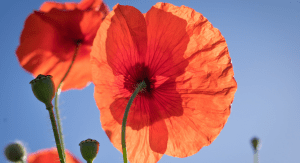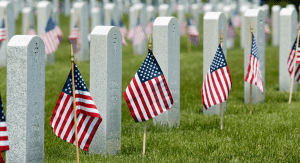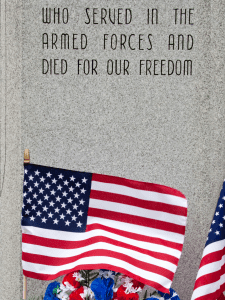 For many people in the United States, the last weekend in May signifies the start of the summer season. If schools aren’t out already, this three-day weekend is a welcome relief before the final push to the end. Visions of hamburgers sizzling on the grill begin to dance in the mind’s eye. We know the time is approaching for sun-soaked days, children lathered in sunscreen jumping into pools, fireflies to catch at night, and freedom from the tyranny of school schedules, extracurriculars, and all the car lines. The long weekend that traditionally kicks off summer is called Memorial Day weekend. Yet, if you’re anything like I was 20 years ago, you might not know that this weekend has nothing to do with the commencement of summer.
For many people in the United States, the last weekend in May signifies the start of the summer season. If schools aren’t out already, this three-day weekend is a welcome relief before the final push to the end. Visions of hamburgers sizzling on the grill begin to dance in the mind’s eye. We know the time is approaching for sun-soaked days, children lathered in sunscreen jumping into pools, fireflies to catch at night, and freedom from the tyranny of school schedules, extracurriculars, and all the car lines. The long weekend that traditionally kicks off summer is called Memorial Day weekend. Yet, if you’re anything like I was 20 years ago, you might not know that this weekend has nothing to do with the commencement of summer.
Memorial Day’s History
The history behind Memorial Day is not unlike the history behind much of what we celebrate as tradition today, in that there are more than a few claims on its origin. Suffice it to say, Memorial Day began almost immediately after the cessation of the Civil War in the United States. (It was originally called Decoration Day because the central objective of the day was to decorate the graves of the war dead.) It was born out of a need to remember those that had given their lives in a war that tore this nation apart. As human beings, we know there is great value in remembrance.
Traditions Began
As early as 1865, it is reported that newly emancipated slaves in Charleston, SC, gave Union soldiers (that died in a makeshift prison) a proper burial. These soldiers had primarily died of exposure and were left in a mass grave before the Confederate Army left after Charleston fell. Then, on May 1 of that same year, some 10,000 people, primarily freed slaves, members of black Union regiments, and white missionaries, gathered to honor those Union dead with a parade, flowers, and singing.
The next year, in 1866, efforts to hold springtime tributes to the Civil War dead, both Union and Confederate, were popping up everywhere. Women in Columbus, Mississippi, who had gathered to decorate the graves of Confederate soldiers noticed untouched Union soldier graves and made a point to place flowers on those graves as well. As many as 25 places were recorded as having these first Decoration Days, primarily in the southern states where the majority of the war dead were buried.
The nation seemed to know the importance of recognizing the hundreds of thousands of lives lost in the war (approx. 750,000). For every soldier dead there is a mother, a father, a sister or brother, a sweetheart, and perhaps even a child that grieves. Their loss is felt in myriad of ways over and over again as years pass. Remembrance is an imperative for those that remain.
The First Official Memorial Day
In 1868, Gen. John Logan of the Grand Army of the Republic gave the first official Memorial Day Order, “designated for the purpose of strewing with flowers or otherwise decorating the graves of comrades who died in defense of their country. . . .Let us, then, at the time appointed, gather around their sacred remains and garland the passionless mounds above them with choicest flowers of springtime; let us raise above them the dear old flag they saved from dishonor; let us in this solemn presence renew our pledges to aid and assist those whom they have left among us as sacred charges upon the nation’s gratitude—the soldier’s and sailor’s widow and orphan.” The first Memorial Day ceremony on May 30, 1868, was held at Arlington National Cemetery, with flags placed on each grave. This tradition is still held today in Arlington and other National Cemeteries and is known as “Flags In.”

After World War I, Memorial Day became a day to honor those that had died in all of the United States’ wars. WWI saw the loss of 117,000 US soldiers, and the pain of loss was magnified when bodies were thousands of miles away from families. The poppy flower became a symbol of remembrance after a Canadian officer, Major John McRae, penned the poem “In Flanders Fields” after seeing his friend killed during the Second Battle of Ypres. The poem underscores the jarring reality of what is immediately lost when a life is taken by war:
We are the Dead. Short days ago
We lived, felt dawn, saw sunset glow,
Loved and were loved, and now we lie,
In Flanders fields.
Why Memorial Day is Important to Me
Memorial Day became significant to me in 2008. Eight months prior, on September 10, 2007, my husband was killed in Iraq, and for the first time I felt the impulse to assign importance to a day that I hadn’t ever given much thought to, to my shame. Now, the last Monday in May is a day that I am intricately tied to—he is buried in Arlington National Cemetery and Flags In remains a day that I am inexpressibly grateful for.

Currently, my family lives in Birmingham. I am remarried and have added two daughters to the one I had with my first husband. I can’t get to Arlington as often as I would like and I am thankful to know that there will be people who will “Let no wanton foot tread rudely on such hallowed grounds. Let pleasant paths invite the coming and going of reverent visitors and fond mourners” (Memorial Day Order). His grave will be seen, his name might be uttered, and his memory will remain. He “lived, felt dawn, saw sunset glow. . .he loved and was loved, and now he lies.” I don’t want him to be forgotten.
So what can we do here in Birmingham then, to make Memorial Day significant for our families? Many of us have the desire to teach our children why we lay markers along the year to remember. How can we teach them that remembrance unifies a people? How can they learn that it honors lives that were lost and protects our hearts against the hardness of indifference? Thankfully, we have a few things around Birmingham and surrounding areas that we can connect to.
Birmingham Memorial Day Ideas
Visit the Alabama National Cemetery
On Monday, May 29, there will be a Memorial Day Ceremony at the Alabama National Cemetery starting at 9:00 a.m. There will be patriotic music, a flyover, ceremonial wreath-laying by family members of military heroes who are interred at ALNC, a rifle salute, TAPS, a cannon salute, and more. Find out more here.
Visit the Alabama Veterans Memorial Park
This outdoor park is “a permanent memorial park to honor Alabama veterans and for teaching, for learning, and for celebration of peace and democracy. This twenty-two-acre Park, dedicated in May 2001, will stand for all time as a tribute to the Alabamians who fought and came home, as well as those who died in the wars of the 20th and 21st centuries.” A trail leads into the park where you’ll find the Memorial Plaza and the powerful Hall of Honor. This is a list of 11,000 names of Alabamians killed in action from 1900 forward. It’s is a great place to spend some time with your kids. You can teach them to read the names and practice reverent quietude. Take time to ponder what many of these men and women have done for our nation. Find out more at about this park here.
Visit American Village for FREE
American Village has free admission for all on Memorial Day. You can remember America’s fallen at an 11:00 a.m. service in the Colonial Chapel. This will be followed by a wreath-laying at the National Veterans Shrine. Then, take time to explore the 188-acre American Village campus. You can find replicas of Mount Vernon, the Oval Office, Concord Bridge, and the West Wing of Independence Hall. Several family-friendly activities are offered from 10:00 a.m. to 4:00 p.m. on Memorial Day. Find out more and see the schedule of events here.
Make your way around Birmingham’s various memorials:
- Wonder why it’s called Kelly Ingram Park? See if your kids can find both memorials in the park. There is one dedicated to Osmond Kelly Ingram, and one dedicated to Julius Ellsberry. Which one of them was awarded the Medal of Honor?
- Why is the Rainbow Viaduct connecting Southside to downtown called that? See if you can walk the bridge and find out how many battles the 167th fought in WWI. There’s a plaque along the bridge (Richard Arrington Jr. Blvd). Did you know they were the nation’s only regiment in WWI to be referred to after their home state? (“The Alabama”) You could even do some research ahead of time and find out how many regiments fought in WWI.
- Did you know there is a monument at Avondale Park? Look for it near the baseball fields: “Dedicated to the Sacred Memory of the Avondale Boys. . .” Who were they?
- Leeds Memorial Park has a space dedicated to the unknown soldier, POW, and those MIA. The park is located at 1159 Montevallo Rd.
Have Intentional Remembrance Time with Your Family
Spend some time on Memorial Day to explore what Memorial Day is. What do your kids think about it? What questions do they have about the military or war (or Ukraine, or mass shootings, etc.)? Chances are, they hear and see things that they don’t quite know how to process or ask helpful questions about. Look up a list of Medal of Honor recipients (my great uncle was one!) and read their citations. Ask them how they feel about it all. Above all, Memorial Day is a day to remember. So, use this day to cultivate that desire in the hearts of your children and show them how it can be meaningful.












